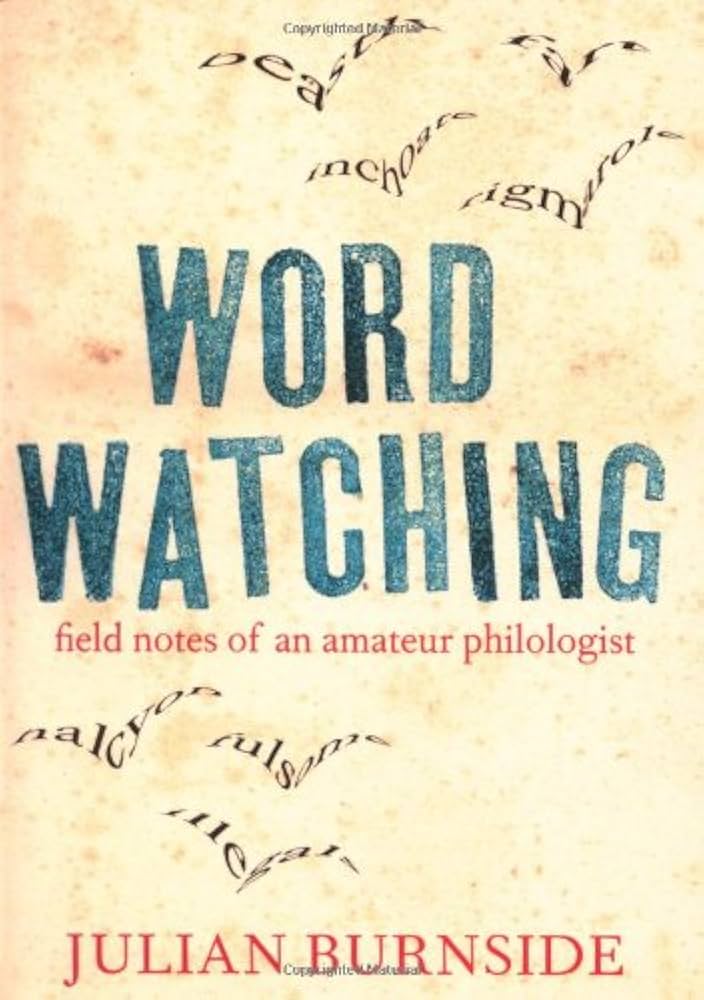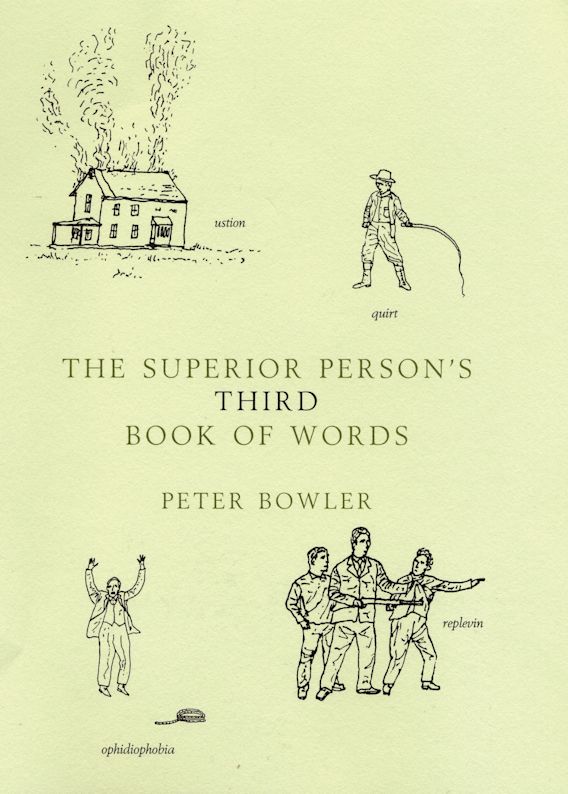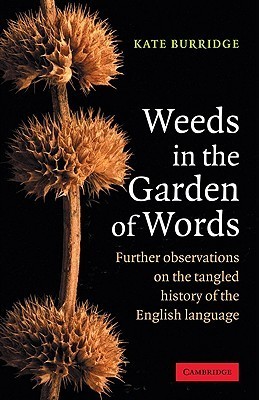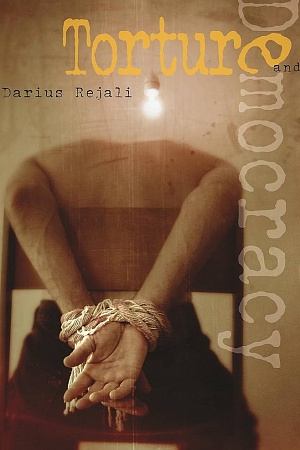The Superior Person's Third Book of Words
Bloomsbury, $29.95hb, 152pp
Weeds in the Garden of Words: Further observations on the tangled history of the english language
ABC Books, $24.95pb, 230pp
Weaponish Sorts of Things
On the back cover of Don Watson’s Dictionary of Weasel Words, the entry for ‘absolute certainty’ is reproduced: ‘1. Beyond a doubt; scout’s honour; on impeccable authority, irrefutable evidence; watertight, ironclad; London to a brick; bet your arse (or ass) on it. 2. Not necessarily the case.’ The first definition offers the standard, transparent meanings; the second offers its ‘weasel-word’ meaning – what it means when it is minced through the minds of ‘the powerful, the treacherous and the unfaithful’, particularly bureaucrats and politicians. A citation from Vice President Dick Cheney on 2 September 2002 demonstrates weaseling or weasling in action (see Kate Burridge’s discussion of the process of haplology in her book Weeds in the Garden of Words for the likely transformation of ‘weaseling’ into ‘weasling’): the weaselly vice president says: ‘We do know, with absolute certainty, that he is using his procurement system to acquire the equipment he needs to build a nuclear weapon.’
The Dictionary of Weasel Words is a follow-up to Watson’s highly successful Death Sentence: The Decay of Public Language (2003). That was an elegantly stylish, passionate and witty essay on the way the language of managerialism and bureaucracy has stifled the English language to such an extent that it is now ‘a dead language: devoid of lyric or comic possibility, incapable of emotion, complexity, or nuance’. This new book is a dictionary of these death-like words, many examples of which were sent to Watson by readers of the first book.
I was delighted to find an entry for ‘closure’, one of those buzzwords that seem to have infected all levels of the language: ‘1. Finish, conclusion, completing the circle. 2. Notion deriving from Gestalt theory that “completion” is a primary human need (or “want” that has grown into a need) replacing paradox, doubt, enigma, vagaries of fate, the essential unknown, the existential dilemma, the Book of Job, etc.’ The jargon of managerialism is subjected to satire: ‘client’, ‘decruitment’, ‘greenwashing’, ‘growing the client base’, ‘negative patient outcome’ (my pet hate), and so on. The term ‘level playing field’ gets the definition it deserves: ‘cf. Tooth Fairy, Yeti, Min Min Light, etc.’ The language of recent world events, especially the Iraq war, is dissected: ‘attrited’, ‘coalition of the willing’, ‘deconflicted’, ‘embedded’, ‘axis of evil’, ‘security contractors’ and ‘torture lite’. The definition of ‘weapons of mass destruction’ is typical of the analysis: ‘Thingamebobs, jiggers, hoozits, doodads, watchamecallits, wigwams for a goose’s bridle, etc. Weaponish sorts of things. Destructive sorts of things. Destructive items possibly related to weapons. Weapons developed by countries that are not free.’
There is trenchant wit and satire, but underlying it, I think, is a profound sadness. The book laments not just the death of public language but also the death of those values that give meaning to public life. This is especially true of the Australian material. Thus ‘anti-American’ has the obvious sense of exhibiting dislike for the US, but in this dictionary it also means ‘2. The ABC’ and ‘3. un-Australian’. ‘Border protection’ has some relatively neutral meanings, but by sense 4 we find: ‘Xenophobia. Wedge politics. Scare campaign. To incite fear and loathing.’ The first sense of ‘the bush’ is: ‘The country. Rural Australia. Not the city. Not Sydney. That with which all Australians should be in touch’. There is gentle wit here, but by sense 3 the traditional icon is a Desert of Despond: ‘A dangerous place, hated by Henry Lawson, the dark side of the psyche, home to sociopaths, murderers, cannibals, etc. (Matthew Brady, Kelly Gang, Ivan Milat, Snowtown murderers, etc.). A place for incarcerating asylum seekers; exploding nuclear weapons, dumping nuclear weapons; dumping rubbish, dumping car bodies, dumping human bodies. A dumping ground.’ I leave it to readers to see what Watson does with ‘Anzac’.
When the general public thinks about the issue of the death of language, this often has to do with the notion that language is becoming corrupted by errors – errors that conservative speakers see as evidence that all social values are collapsing and the end of the world is possibly nigh. Much of Burridge’s book deals with this more popular notion of language death: the ‘weeds’ of the book’s title, which surface as wrong pronunciations (whatever happened to the ‘k’ of ‘knit’ and ‘know’ or the ‘g’ of ‘gnaw’ and ‘gnash’?), wrong spellings, wrong grammar (is it ‘less’ or ‘fewer’, is it computer ‘mice’ or ‘mouses’?), and so on. But the title is double-edged, for what is a weed to one gardener is a flower to another.
There is an interesting example of a lexical weed in Watson’s entry for ‘absolute certainty’: the phrase ‘London to a brick’. It is generally acknowledged that this phrase was the invention of the Sydney racing commentator Ken Howard. It appears in the form ‘London to a brick’ in the Australian National Dictionary (AND, 1988). (In this and the later mention of AND, I am happy to declare my close association with the Australian National Dictionary Centre, the Centre that edits AND; I edit the Centre’s newsletter, Ozwords.) ‘London to a brick’ means ‘it is absolutely certain’. But the first citation in the Australian National Dictionary demonstrates that the original phrase cannot have been ‘London to a brick’. The phrase is first recorded in Frank Hardy’s Yarns of Billy Yorker (1965): ‘“Close: but Magger by a head,” the course announcer Ken Howard says, “London to a brick on Magger”.’ The original phrase must have been ‘London to a brick on’. Howard did not mean that the chances were ‘a million to one’ that Magger won the race; he meant that the odds were ‘a million to one on’ – so overwhelmingly certain that you would have to gamble London to win a beastly ‘brick’. But the precise gambling reference is lost to users of the phrase in the form ‘London to a brick’. And I bet few people who know or use the phrase realise that we are not dealing with real-estate metaphors – a ‘brick’ was £10, from the colour of the £10 note. Should we be enraged by these changes? Should we despair at the fact that so many Australians have lost their grasp of the language of gambling? Should we berate those same Australians for not knowing what ‘brick’ meant in Australian English until the introduction of decimal currency ‘on the fourteenth of February 1966’?
Probably not. But we certainly need books of the Burridge kind, which examine much of the history of changes in the English language. I was interested to see that towards the end of the book Burridge deals with some of the issues raised by Watson’s book, examining some really pernicious weeds of the kind it exposed. Some of her examples are from Australian history, as when ‘disperse’ was used in the nineteenth century as a euphemism for slaughtering Aborigines, and when a report of a ‘collision’ between police and Abori-gines was invariably a euphemism for killing.
In a sense, then, there is nothing new about ‘weasel words’. But it is their present ubiquity that rightly disturbs Watson. In the introduction to his book, Watson explains the title. He writes: ‘In As You Like It, Jaques says he can suck “melancholy out of a song as a weasel sucks eggs”.’ Many of the words in his dictionary have been sucked dry of meaning: ‘They are shells of words: words from which life has gone, facsimiles, frauds, corpses.’ As a counterpoint to this, it is pleasing to see two books that cater to a playful delight in language. Richard Glover’s Dag’s Dictionary is a collection of words that do not exist but that are necessary to describe many of the experiences of contemporary life. Some of them come from listeners to Glover’s ABC Sydney Drive programme, but most of them are Glover’s inventions. Thus a ‘brick teaser’ is ‘a person who goes to “open for inspection” houses with absolutely no intention of buying, but merely to have a stickybeak’; and a ‘woofhead’ is ‘a person whose hairstyle is modelled on that of their dog’. Peter Bowler’s The Superior Person’s Third Book of Words is a similar collection of flamboyantly unlikely words, although this time the words are real: ‘aichmophobia’, ‘ceroscopy’, ‘gugusse’ (‘According to Mrs Byrne’s amazing dictionary [Josefa Heifetz Byrne, Mrs Byrne’s Dictionary of Unusual, Obscure and Preposterous Words (1976)] a gugusse is “a young, effeminate man who trysts with priests”. Can such things be? And can you say “trysts with priests” three times quickly?’), ‘kennebunker’, and ‘lipostomy’ (‘atrophy of the mouth’). Bowler also offers sage advice on how these very superior words might be used in everyday conversation: ‘Useful term for cursing an overly loquacious sibling: “May you have lipostomy ’ere nightfall!”’ Like Glover, Bowler at one point makes up his own word. On the pattern of ‘lapsus linguae’ (‘a slip of the tongue’) and ‘lapsus calami’ (‘a slip of the pen’), he creates ‘lapsus pictorae’, a term especially used to describe moments of anachronism in films: tyre marks in Stagecoach; a zip fastener in a medieval romance; television aerials in nineteenth-century epics. (What sort of lapsus, Bowler asks parenthetically, was ‘the American college-student’s assertion in an exam paper that “Louis Pasteur discovered a cure for rabbis”?’)
Julian Burnside, in a chapter called ‘Black Holes’ in his book Wordwatching, similarly laments the fact that, while English is a remarkably rich language that has borrowed wantonly from many languages, there remain some significant gaps. Where is the word ‘for the sensation of disaster narrowly averted and later remembered from the vantage point of safety’? And where is the word for the ‘instantaneous sensation when, for example, you are pulled over by a booze bus, and have not had a drink for two weeks! Despite demonstrable innocence, there is a flash of guilt.’ Burnside’s book is similar in structure to Burridge’s, with each chapter addressing historical aspects of the English language or aspects of contemporary usage. The best chapter is ‘Doublespeak’, where Burnside draws on his experience as an outstanding refugee-rights advocate and offers a devastating analysis of the language used to describe refugees in Australia in the past few years: ‘illegals’ and ‘queue jumpers’, who are imprisoned in camps surrounded by razor wire and electrified fences (‘energised fences’ in the language of the bureaucracy), and who, when driven to suicide or atrocious self-harm, are accused of indulging in ‘inappropriate behaviour’. In this chapter, Burnside could be writing a section of Watson’s book.
Wordwatching is subtitled ‘Field Notes from an Amateur Philologist’. Given that caveat, I suspected it was London to a brick on that there would be some problems. And there are. I offer three examples. Burnside draws his evidence about the history of Australian words from the second edition of the Oxford English Dictionary (OED). But the most up-to-date record of Australian words is AND. So, in a section on obsolete Australian slang, Burnside gives the OED’s earliest date of 1945 for ‘Prince Alberts’ in the sense ‘foot rags worn by swagmen or tramps’, when AND has it from 1892; ‘boko’, meaning ‘blind in one eye’, is similarly given as 1945, when AND has it from 1847. And so on. In Chapter 4, ‘Bushrangers’, Burnside examines part of Ned Kelly’s Jerilderee letter: ‘He [Kelly] discusses the idea that police witnesses regularly perjure themselves and adds that “it was by that means and by hiring cads they get promoted”. This use of cad is puzzling. According to OED2, cad means: “An assistant or confederate of a lower grade, as a bricklayer’s labourer (dial.); a familiar, chum”. Neither of these senses makes much sense in the context of the Jerilderee letter.’ Burnside goes on to argue that Kelly’s ‘cad’ comes from ‘cicada’: ‘Cad was Australian slang for a cicada, now out of use. It seems likely that the reference was to police informers who, like a cicada, will make a lot of noise when prompted.’ E.E. Morris, in Austral English (1898), has ‘cad’ as a slang term for ‘cicada’ in Queensland, although there is not much evidence for this unlikely phonetic reduction. But Kelly’s use of ‘cad’ is clearly in keeping with the OED’s fifth meaning: ‘A fellow of low vulgar manners and behaviour. (An offensive and insulting appellation.)’ We need look no further.
In Chapter 26, ‘Obscene Words’, Burnside discusses ‘fuck’ and its paltry English synonyms and euphemisms. He notes Chaucer’s use of ‘swive’ and proceeds to recommend Chaucer’s use of ‘hump’ in the Manciple’s Tale. He quotes the passage: ‘Never tell any man, through all your life, / How that another man has humped his wife.’ Now my ear immediately told me that there was something odd about this couplet. Did Chaucer really write as clumsily as this? I checked my Chaucer and discovered that he wrote: ‘Ne telleth nevere no man in youre lyf / How that another man hath dight his wyf.’ Here was the couplet-mastering Chaucer, and a Chaucer who never used ‘hump’ in this sexual sense. Shakespeare knows about the ‘beast with two backs’, but it is not until the late-eighteenth century that observers of couples in the missionary position started to call the procedure ‘humping’. Did it occur to no one who read the book at its various stages of editing that this does not look like Chaucer at all; that it is in fact a modern translation? Alas, the death of our literary heritage! And alas, too, Don Watson – it was Shakespeare’s ‘Jaques’ (not ‘Jacques’) who first told us about weasel words!












Leave a comment
If you are an ABR subscriber, you will need to sign in to post a comment.
If you have forgotten your sign in details, or if you receive an error message when trying to submit your comment, please email your comment (and the name of the article to which it relates) to ABR Comments. We will review your comment and, subject to approval, we will post it under your name.
Please note that all comments must be approved by ABR and comply with our Terms & Conditions.